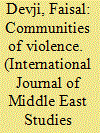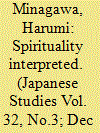|
|
|
Sort Order |
|
|
|
Items / Page
|
|
|
|
|
|
|
| Srl | Item |
| 1 |
ID:
124488


|
|
|
|
|
| Publication |
2013.
|
| Summary/Abstract |
Violence is a word seemingly meant for theorizing, being as abstract and thus as capacious as any category can be. And indeed the history of its use has only confirmed the all-encompassing character of violence, which can now name almost any kind of action or affect: physical, psychological, and even ideological. And yet this term is also deployed to name the most distinctive and visceral forms of cruelty and suffering, such that it is difficult to treat it merely as another abstract category. Shifting uncomfortably between the particularity of pain and the generality of an intellectual category, violence has until recently been ill served by scholarship. The necessities of justice, for example, have meant that violence is rarely the subject of law in its own right, but used only as a euphemism for some degree of murder or charge of battery. And since historians are especially seduced by legal terminology, perhaps because they have traditionally described and justified power, their efforts to mimic the law by finding some party responsible for something have tended not to deal productively with violence.
|
|
|
|
|
|
|
|
|
|
|
|
|
|
|
|
| 2 |
ID:
119698


|
|
|
| 3 |
ID:
117503


|
|
|
|
|
| Publication |
2012.
|
| Summary/Abstract |
Lexical borrowing is associated with emerging social needs. It provides a new word for a newly introduced idea or thing, replaces a native word adding trendiness or euphemism, allows ambiguity, etc. The noun supirichuariti ('spirituality') and the adjective supirichuaru-na ('spiritual') present an intriguing case of borrowing in Japanese. Both emerged in the wider context of the 'New Spirituality' movements and culture in Japan. They began to be used in such professional fields as terminal care, psychology, and education in the 1990s. More recently the use of the word supirichuaru, in particular, has become trendy in the narrower context of a 'spiritual boom', in which it is often associated with 'spiritualism', and has come to refer to a range of interests and experiences associated with the boom. By drawing data from a wide range of discourse genres, this article elucidates the complexity of the borrowing processes. The article also argues that these Western loanwords, used in different subcultures with differing and often elusive meanings, are linguistic evidence, however ephemeral it may be, that reveals a common thread which runs through the current spiritual culture in Japan, where no native Japanese words have been able to take up the role.
|
|
|
|
|
|
|
|
|
|
|
|
|
|
|
|
|
|
|
|
|